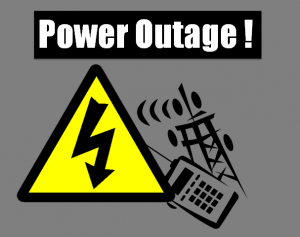 In earlier Advisories we’ve talked about how best to communicate during an emergency when the power is out. Here’s the likely drill:
In earlier Advisories we’ve talked about how best to communicate during an emergency when the power is out. Here’s the likely drill:
- First, try an old-fashioned landline; it may work when your rove-a-phone doesn’t.
- Try your cellphone. But if lines are overloaded, you won’t get through there, either.
- You’re down to option #3, a text message. Because it requires so little bandwidth, it may get through. But if cell towers are down, too? No luck.
So what’s the one phone that is most likely to ALWAYS get through?
You guessed it – a satellite phone!
The sat phone bypasses wires and towers altogether, shooting straight up to one of the satellite networks positioned 500 to 1,000 miles above the earth. Given their position, the satellites are seldom affected by storms and thus won’t be impacted by whatever has hit your local community.
I thought I’d really only seen satellite phones in the movies. Typically, they were boxy and big, with an awkward antenna. And they seemed to appear mostly in the hands of the government, military or quasi-military, and usually on a ship somewhere.
Over the past few years, however . . .
sat phone technology has become refined and phones are now found in the hands of civilians around the world. (So I may have seen one without realizing it!)
There are a number of companies offering the service, with phones that are now not much bigger than your cell phone. (You can see two of the most popular, the Inmarsat IsatPhone Pro Satellite Phone and the Iridium Extreme 9575 Satellite Phone
at Amazon. Each looks to be about half-again as long as a typical cell phone, and to weigh about twice as much.)
Different services, high prices.
Although the different networks work differently, and have different coverage and quality, they do have one thing in common: a relatively high price.
To buy the phone, expect to pay between $500 and $1500. That’s just for the phone itself. You can pay more to get more features, like GPS, tracking, Bluetooth and WiFi capabilities. Most basic models allow you to send and receive text as well as email messages.
In addition, you need to pay for airtime. You can prepay for the time or you can buy a monthly contract. Satellite airtime can be less expensive than cellular roaming rates, or a whole lot more (up to $10 a minute!), depending on which service you have. So, it’s back to knowing in advance just what you need the phone for!
Other things to keep in mind:
- A satellite phone won’t work inside a building. It needs access to the sky in order to “find” the satellite.
- The antenna needs to be extended, so you can’t put the phone in your pocket and expect to know when you’re receiving a call.
- Phone numbers seem to be more complicated. It reminds me of the work-arounds we used to see, where people dialed a local number to get to a trunk line and then another number to get to their desired party.
- There may be dead spots, depending on where you find yourself. Trees, jungles, buildings and mountains can block signals.
- Audio quality may not be as good as what you’re used to.
Even with all these imperfections, satellite phones have become standard equipment for business and for governments. A temporary rental (day, week or month) is easily managed over the internet, with the phone shipped right to you at home. Again, read carefully to be sure you get the accessories and the air-time bundle you need.
When it comes to emergency response, you may want a satellite phone for a particular period of time (say you’re going on a trip), for a season, or all the time.
It’s the ultimate in communications reliability.
As you consider your emergency communications needs, don’t overlook this technology. It could be the insurance you want. (Paying $6.50 for a minute of hearing your child’s voice – priceless!)
(My thanks to author Marc Weber Tobias, whose article in Forbes was the basis for much of what I have written here.)
Virginia
Your Emergency Plan Guide team
P.S. If you have used a satellite phone, let us know your experience!
Don't miss a single Advisory.
Thank you for subscribing.
Something went wrong.

Very interesting…perfect for a community center or volunteer fire department
Yes, good for volunteers. As it turns out, “official” police and fire departments have their own two-way radios with their own channels, not available to civilians. In a remote area, the satellite phone would be the only thing available. Just read an article about forest rangers using satellite phones in the national parks.